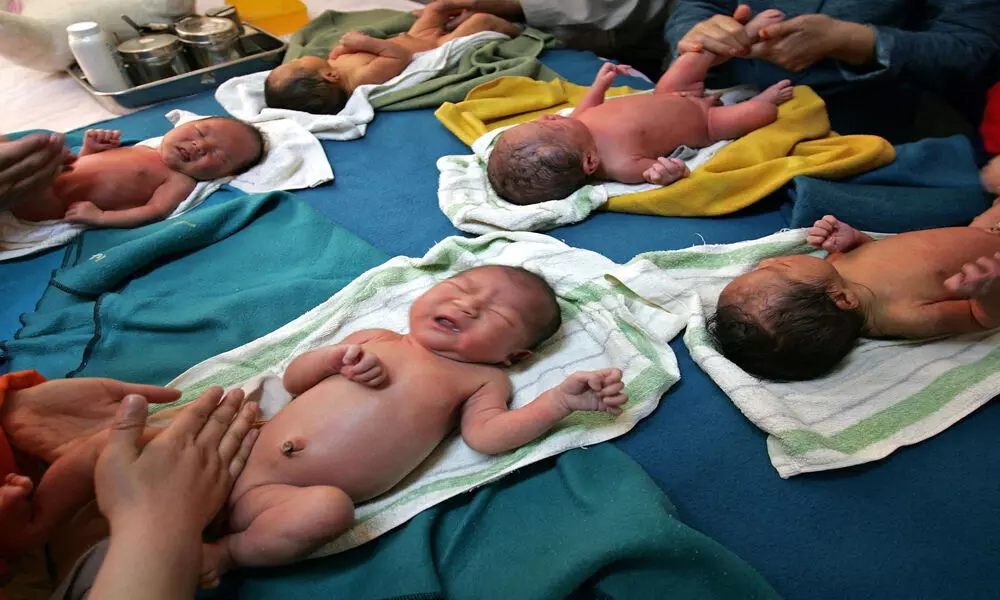'Care for women before seeking baby boom'
Since the one-child policy began to ease in China, there has been only a blip in birth rates
image for illustrative purpose

CHINA's once-in-a-decade census shows what most have long suspected: Efforts to encourage more births after decades of restricting families to one child are falling on deaf ears. It's not a unique problem: South Korea, with the world's lowest fertility rate, saw its population decline for the first time on record in 2020. Even the United States, comparatively young, saw its birth rate drop yet again last year.
Nudging citizens to procreate is easier in theory than in practice and approaches abound — most of them unsuccessful. Financial help for would-be parents, whether in the form of one-off payments, subsidised childcare, tuition and even housing support, is necessary. It's just not always sufficient when it comes to securing a more sustainable birth rate over time. Beijing and much of fertility-challenged East Asia may well have to tackle something less tangible: Reducing the price women pay for opting into matrimony and maternity. That means encouraging divided labor at home and fostering equal opportunities after marriage and children, as well as before. Share that burden, or find women dodging it altogether — in China and beyond. Shrinking populations are not in and of themselves problematic, as I've written before. The issue for China, and for many others, is the speed at which it is happening. China's total fertility rate is now 1.3 births per woman — heading toward Singapore's 1.1 and even South Korea's dire official rate of 0.8. Pro-natalist policies, especially those promoted by populist or authoritarian States with their eye on idealised traditional families, rarely promote women's rights and ambitions. In countries like Hungary, Poland and even Russia, where demographic concerns are front of mind, equality is not benefiting. China, keen to avoid too many single men for political as well as demographic reasons, has sought to stigmatise late marriage by referring to unmarried professional women — many of whom are only children, raised with plenty of opportunities — as "leftover." That's not just poor judgement, it's also bad policy. Tackle the motherhood curse instead.
Consider that since the one-child policy began to ease, there has been only a blip in birth rates. Clearly, shaming women by referring to them as unwanted when they are single — a phenomenon which Leta Hong Fincher, author of Leftover Women: The Resurgence of Gender Inequality in China, dates back to at least 2007 — isn't working. Tuesday's census figures show that last year the number of children born in the country fell to 12 million, the lowest since 1961, when China was coming out of a devastating famine that killed tens of millions. Economic help is clearly vital, and officials have already singled out education and other costs for support. We know one-off payments tend to bring forward births, making little difference to overall fertility, but broad support, in parental leave, social and fiscal policies can work. That's underpinned France's relative success, compared to the rest of aging Europe. But China, and indeed Japan, Korea and others, need to tackle the burden of the unseen costs of motherhood too. In China, women are not infrequently asked about plans for marriage and children in job interviews, implying a penalty. The painful wealth gap widens after the wedding day, when wives are not encouraged to put their name on property deeds even if they have contributed, leaving valuable real estate concentrated in male hands. And after birth, it is still mothers, overwhelmingly, who handle society's fear of failure and unrealistic demands of perfection from their offspring, with all the homework, tutoring and heartache that entails.
It's a grim picture in the most chronically baby-free nations. Japanese and Korean men do fewer hours of unpaid household chores and childcare than counterparts in any other wealthy nation. China does only a little better. According to a study cited by the New York Times in 2019, Japanese women who work more than 49 hours a week do close to 25 hours of housework over that time. Their husbands do an average of less than five. Seoul has pumped billions into improving its birth rate over the past decade or so, with subsidised childcare, nurseries and more — but come the pandemic job cuts, mothers still got hit first. Little wonder fewer are choosing this path. And that's before even considering the stigma (and bureaucratic pain) for Chinese mothers having children out of wedlock.
Beijing's population crunch will no doubt prompt the removal of remaining restrictions on family sizes, drawing a line under decades of meddling to prevent a Malthusian crisis. That shouldn't start a period of meddling to obtain the reverse. Improve the lot of women instead.

